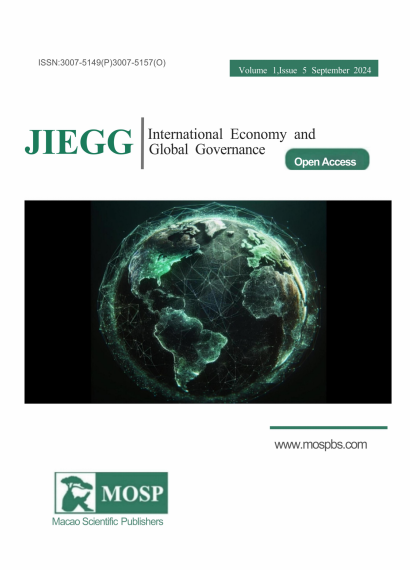-
Hans Morgenthau, “A Political Theory of Foreign Aid,”American political science review, Vol.56, No.2,January1962, pp.301-309.
-
Lucia Majerčiaková, “United States Foreign Policy Towards Djibouti from George W. Bush to Donald J. Trump: A Laboratory of US Strategic Interests in Africa,”MA thesis ,Masaryk University,2019,p.63.
-
Lucia Majerčiaková, “United States Foreign Policy Towards Djibouti from George W. Bush to Donald J. Trump: A Laboratory of US Strategic Interests in Africa,”p.106.
-
Asteris Huliaras and Sophia Kalantzakos, “The Gulf States and the Horn of Africa: A New Hinterland,?”Middle East Policy, Vol.24,No.4,2017, pp.63-73.
-
David Vine, “The United States Probably Has More Foreign Military Bases Than Any Other People, Nation, or Empire in History,”The Nation, 2015, p.14.
-
David Styan, “Djibouti: Changing Influence in the Horn's Strategic Hub,”p.13.
-
Fahmida Alam and Samin Farhan Asef, “The Implications of BRI in Djibouti: A Critical Geopolitical Analysis,”pp.277-283.
-
孙德刚、白鑫沂:《中国参与吉布提港口建设的现状与前景》,《当代世界》2018年第4期,第70-74页。
-
Nicholas Westcott, “The Trump administration’s Africa policy,” African Affairs,Vol.118,No.473,2019, pp.737-749.
-
David Styan, “China’s Maritime Silk Road and Small States: Lessons from the Case of Djibouti,”Journal of Contemporary China, Vol.29,No.122,2020,pp.191-206.
-
Hillary Clinton,“American ’sEnagementintheAsia-Pacific,”October28,2010,http:www.state:gov/secretary/rm/2010/10/150141.Htm[2022-9-13]
-
Hillary Clinton,“America'sPacificCentury,”ForeignPolicy,October11,2011,https://foreignpolicy.com/2011/10/11/americas-pacific-century/ [2022-9-14]
-
Department of Defense,“Sustaining US Global Leadership:Priorities for 21st Century Defense,”January 3, 2012,http://nssarchive.us/wp -content/uploads/2018/01/defense_strategic_guidance.pdf[2022-9-13]
-
Redie Bereketeab, “ Djibouti: Strategic location, an Asset or a Curse?”Journal of African Foreign Affairs, Vol.3,No.1,2016,pp.5-18.
-
Philippe Le Billon and Fouad El Khatib, “From Free Oil to ‘Freedom Oil’: Terrorism, War and US Geopolitics in the Persian Gulf,” Geopolitics,Vol.9,No.1,2004,pp.109-137.
-
Vinay Kaura, “Incorporating Indo-Pacific and the Quadrilateral into India’s Strategic Outlook,”Maritime Affairs: Journal of the National Maritime Foundation of India,Vol.15,No.2,2019,pp.78-102.
-
Muhammad Saeed, “From the Asia-Pacific to the Indo-Pacific: Expanding Sino-US Strategic Competition,”China Quarterly of International Strategic Studies, Vol.3,No.4,2017, pp. 499-512.
-
Zach Vertin, “Red Sea Rivalries: The Gulf, the Horn, and the New Geopolitics of the Red Sea,”Brookings Doha Center, 2019.
-
Lucia Majerčiaková, “United States Foreign Policy Towards Djibouti from George W. Bush to Donald J. Trump: A Laboratory of US Strategic Interests in Africa,”p.67.
-
Sun,Degang and Yahia H. Zoubir, “The Eagle's Nest in the Horn of Africa: US Military Strategic Deployment in Djibouti,” pp.111-124.
-
Sun,Degang and Yahia H. Zoubir, “The Eagle's Nest in the Horn of Africa: US Military Strategic Deployment in Djibouti,” pp.111-124.
-
Abdo A Abdallah, “ State Building, Independence and Post-Conflict Reconstruction in Djibouti”Post-conflict peace-building in the horn of Africa, 2008,pp.269-279.
-
Timothy Walker, “Capacity Building for Maritime Security: the Western Indian Ocean Experience,” International Affairs,Vol.97,No.1,January2021,pp.242-244.
-
Ra Mason, “ Djibouti and Beyond: Japan’s First Post-War Overseas Base and the Recalibration of Risk in Securing Enhanced Military Capabilities,”Asian Security,Vol.14,No.3,2018,pp.339-357.
-
Sun,Degang and Yahia H. Zoubir, “The Eagle's Nest in the Horn of Africa: US Military Strategic Deployment in Djibouti,” pp.111-124.
-
Sonia Le Gouriellec, Djibouti’s Foreign Policy in International Institutions: the Big Diplomacy of a Small State, African Foreign Policies in International Institutions,Palgrave Macmillan, New York, 2018,pp.389-402.
-
David Styan, “Djibouti: Changing influence in the Horn's Strategic Hub,”p.10.
-
Sun,Degang and Yahia H. Zoubir, “The Eagle's Nest in the Horn of Africa: US Military Strategic Deployment in Djibouti,” pp.111-124.
-
Shaul Shay, “ Al Shabaab from local to Regional and Global Terror Threat,”Journal of Central and Eastern European African Studies,Vol.1,No.3,2021,p.37.
-
Nicolas Sarkozy,The French White Paper on Defence and National Security,Odile Jacob Publishing Corp, 2008.
-
David Styan , “Djibouti: Small State Strategy at a Crossroads,” Third World Thematics: A TWQ Journal, Vol.1,No,1,2016,pp.79-91.
-
David Styan , “Djibouti: Small State Strategy at a Crossroads,” pp.79-91.
-
Ra Mason , “Djibouti and Beyond: Japan’s First Post-War Overseas Base and the Recalibration of Risk in Securing Enhanced Military Capabilities,” pp.339-357.
-
Jean-Pierre Cabestan, “African agency and Chinese power: the case of Djibouti,”October 2020.
-
Zach Vertin, “Great Power Rivalry in the Red Sea: China’s Experiment in Djibouti and Implications for the United States,” Brookings Institution, June 2020,pp.1-30.

